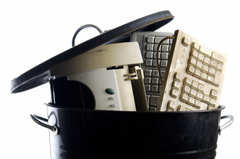
The computer monitor behind my East Vancouver home has been languishing for two weeks, abandoned in the alley by a deadbeat owner either too lazy to recycle or too ignorant to know that better disposal options now exist.
Compared to its flat-screen successors, the bulbous cathode ray tube (CRT) monitor seems laughably wide, but what is concealed inside is anything but amusing: a nasty cocktail of barium, mercury, phosphorus, brominated flame retardants and lead.
To control the flow of such toxic e-waste to B.C. landfills, the provincial government stepped in and imposed an innovative fix beginning in August 2007 known as "extended producer responsibility." Simply put, this approach shifts the cost of recycling from taxpayers and government to producers and consumer buyers.
"It has become part of our culture to drop stuff on the curb and have the city take it away when we don't want it anymore," says Helen Spiegelman of the watchdog group Zero Waste Vancouver. "But now there is this cultural shift, where recycling is a cradle-to-cradle extended warranty by the producer, as opposed to a free public service offered by the mayor and council."
Since the program began, consumers across B.C. have paid an Environmental Handling Fee on purchases of new computers, TVs and a limited list of electronics; industry in turn has been obligated to collect fees and set up ethically-audited programs to ensure such materials do not enter the municipal waste stream or container ships to China.
But as the abundance of castaway electronics in our alleys and streets attests, not everyone is getting with the program. The industry-led process lacks the deposit incentive that has driven beverage container returns as high as 95 per cent, and is forcing Vancouver city taxpayers to pick up the tab for collection of derelict e-waste like the obsolete monitor in my alleyway.
What's more, none of the electronics currently recovered through the program will be reused, regardless of working order: for everything collected, there's a downstream recycler and smelter in the immediate future.
Measuring success
Under the banner of the non-profit Electronics Stewardship Association of BC (ESABC), major manufacturers selling electronics in B.C. are responsible for the operation of 94 provincial collection depots, which currently receive an average 1000 metric tonnes a month.
Less than two years in operation, Metro Vancouver environmental planner Andrew Doi says it is too early to know exactly how effective this industry-led recycling approach has been in terms of recovery rate and public compliance.
Before the program started, a Metro Vancouver waste composition study (designed to see what was being discarded in our landfills) estimated that more than 20 tonnes of computers, monitors, printers and TVs were trashed in metro landfills in 2004. In the 17 months the program has been operating, 12,000 tonnes of electronics were diverted from landfills across the entire province by the ESABC program.
Measuring success has been complicated by the recent spike in disposals of CRT monitors and TVs, as flat screen technology has become ubiquitous. Consumers also tend to keep computers and electronics over long periods of time, so measuring sales against returns is not an accurate measure. At present, nobody really knows how much is being discarded, and that is not likely to change despite efforts by the province to prescribe targets on industry.
Under B.C.'s recycling regulation, a 75 per cent minimum recovery rate is prescribed for the industry-led stewardship programs as a performance target, but there is not a specific timeline for manufacturers to reach this target.
"We gauge success somewhat differently," says Joyce Thayer, the ESABC executive director. "We recycle about 2.5 kilograms of our limited set of products, per person, per year in B.C., which is the second most successful program in North America.
Thayer adds that their job is even harder considering that more than 90 per cent of the products they have collected to date are 'heritage' devices -- old electronics bought before fees were collected for recycling, which they are still obliged to take.
Enforcing an electronics landfill ban
In January of 2008, Metro Vancouver imposed a landfill ban making it illegal to dispose of the electronics covered by the industry recycling initiative; the rationale for the ban was that landfilling e-waste was now unnecessary because consumers and business now had a recycling alternative.
With this ban has come the need for enforcement and fines: according to Metro Vancouver senior engineer Chris Allan, inspectors currently sift through 10 per cent of the waste loads coming to transfer stations and landfill sites across the Lower Mainland in search of banned materials. Inspectors encounter about 1500 violations of the electronics ban every year, imposing fines ranging from $1.50 to $500 depending on the size of the total load.
"We don't really have a handle on how much [banned electronics] is slipping through," he says, adding that Metro Vancouver is looking to increase inspection manpower in the near future.
This job will become more daunting as electronics recycling will expand dramatically in the coming three years under the same product stewardship model: by January 2010 recycling will be in place for small appliances, lighting equipment (including all light bulbs) and some batteries, and on July 1, 2012, large appliances, electric power tools, and more battery types will be covered. (For full list, see: www.env.gov.bc.ca/epd/recycling/electronics/info.htm.)
Picking up after deadbeats
The City of Vancouver estimates that about five per cent of the abandoned garbage it picks up today is derelict electronics, and that the quantity of such waste has increased markedly since the Metro Vancouver landfill ban took effect one year ago.
"This situation, where people are abandoning electronics , there's really no rhyme or reason to it because there are four or five depots in Vancouver alone," says Lindsay Moffit, recycling coordinator for the City of Vancouver.
In the case of the monitor abandoned in my East Vancouver alleyway, Moffit says a city crew will likely pick it up; it will then be transported to the Vancouver South transfer station, and collected by Encorp, the primary operator and manager of the ESABC electronics recycling program.
The only difference in this above process compared to returning electronics to a depot is that the deadbeat who threw the monitor in the alley is willing to let Vancouver City taxpayers do the heavy lifting.
Related Tyee stories:
- Earth's Eighth Continent
It swirls. It grows. It's a massive, floating 'garbage patch.' - The iPod Is Bad Garbage
The BC author of 'Made to Break' outlines the high price of planned obsolescence. - Rebooting Canada's Approach to E-waste
A bright idea to shrink the digital divide, and Third World landfills.
Read more: Science + Tech, Environment
















Tyee Commenting Guidelines
Comments that violate guidelines risk being deleted, and violations may result in a temporary or permanent user ban. Maintain the spirit of good conversation to stay in the discussion.
*Please note The Tyee is not a forum for spreading misinformation about COVID-19, denying its existence or minimizing its risk to public health.
Do:
Do not: